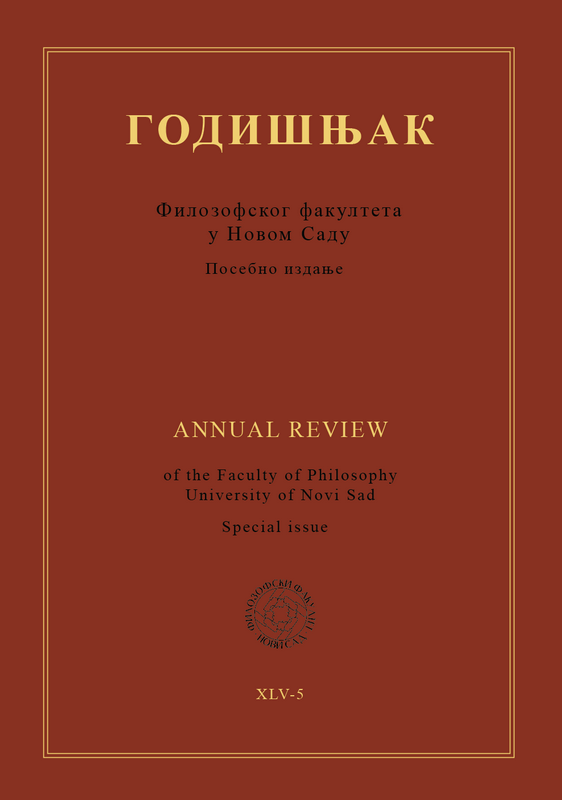ANIMAL SOUNDS AS REPORTING VERBS IN TRANSLATIONS FROM ENGLISH INTO BCMS
Main Article Content
Abstract
This paper discusses the use of animal-sound reporting verbs (e.g. grunt, bark, croak) in English literary texts and the significance they are assigned in Serbian translations. Based on a corpus of Dickens’s novels Oliver Twist, David Copperfield, and Great Expectations, an analysis of animal-sound reporting verbs will be carried out in the SL and the TL texts for the purpose of learning whether the animal trait is (accurately) preserved in translations. Firstly, the translations of these verbs will be subject to componential analysis to determine if they retained the animal feature. The next step is checking if the translation solutions that do retain the animal feature accurately reflect the sound. Finally, translations that fail to convey the animal feature and the intended sound will be analyzed in order to determine the translation procedure employed. The preliminary hypothesis is that animal-sound verbs will largely be translated as their equivalent verbs (e.g. growls=reži). This research is important because animal-sound reporting verbs often serve as stylistic devices and offer glimpses into fictional characters’ nature. Additionally, since few studies exist on the translation of reporting verbs from English into BCMS, this paper could draw more focus on them and shed more light on this specific matter.
Downloads
Metrics
No metrics found.
Article Details
References
Dickens, C. (1861). Great Expectations. London: Chapman and Hall.
Dickens, C. (1838). Oliver Twist. London: Richard Bentley.
Dikens, Č. (1974). David Koperfild. Beograd: Nolit. (translated by Mihailo Đorđević & Jugoslav Đorđević).
Dikens, Č. (2005). Velika Očekivanja. Zagreb: Globus media. (translated by Zlatko Gorjan).
Dikens, Č. (1969). Oliver Tvist. Beograd: Nolit. (translated by Božidar Marković).
Dickens, C. David Copperfield. https://www.planetebook.com/free-ebooks/david-copperfield.pdf
Dickens, C. Great Expectations. http://www.planetpublish.com/wp-content/ uploads/2011/11/Great_Expectations_NT.pdf
Dickens, C. Oliver Twist. https://www.planetebook.com/free-ebooks/oliver-twist.pdf
Dikens, Č. David Koperfild. https://kupdf.net/download/268-arls-dikens-david-koperfild_5afe6a30e2b6f50716237c27_pdf
Dikens, Č. Velika Očekivanja. https://issuu.com/vesnasavic6/docs/velika_ ocekivanja_-_charles_dickens
Dikens, Č. Oliver Tvist. https://www.scribd.com/document/332216786/%C4% 8Carls-Dikens-Oliver-Tvist-pdf
REFERENCES
Baker, M. (1992; 2006) In Other Words. New York, Routledge.
Brown, G. (1990). Listening to Spoken English. Harlow, U.K.: Longman Group Ltd.
Brüngel-Dittrich, M. (2005). Speech Presentation in the British and German Press. Berlin: Peter Lang. [As cited in: San Segundo, P. (2017). Reporting verbs as a stylistic device in the creation of fictional personalities in literary texts. Atlantis, 39 (2), 105-124.]
Caldas-Coulthard, C. (1987). Reported speech in written narrative texts. In: Malcolm Coulthard (ed.) (1987). Discussing Discourse. Birmingham: University of Birmingham.149-167.
Hatim, B. and Munday, J. (2004) Translation: An Advanced Resource Book. New York: Routledge.
Koller, W. (1995). [As cited in Hatim and Munday (2004): “The Concept of Equivalence and the Object of Translation Studies”, Target 7:2: 191-222.]
Leech, G. (1983). Principles of Pragmatics. London & New York: Longman.
Newmark, P. (1988). A Textbook of Translation. Hempstead, U.K.: Prentice Hall International.
San Segundo, P. (2017). Reporting verbs as a stylistic device in the creation of fictional personalities in literary texts. Atlantis, 39 (2), 105-124.
San Segundo, P. (2018). CLiC and Dickens’s not-so-conspicuous techniques of characterisation: Reporting verbs. [Blog post] Retrieved from https://blog.bham.ac.uk/clic-dickens/2018/01/13/clic-and-dickenss-reporting-verbs/
Silk, D. (2007). Bee Parables. Maitland, FL: Xulon Press.
Vujanić, M.-Gortan-Premk, D.-Dešić, M., et al. (2011). Rečnik srpskoga jezika. Novi Sad: Matica srpska.




